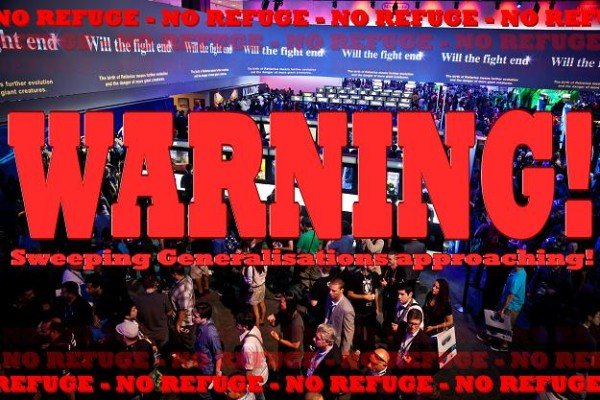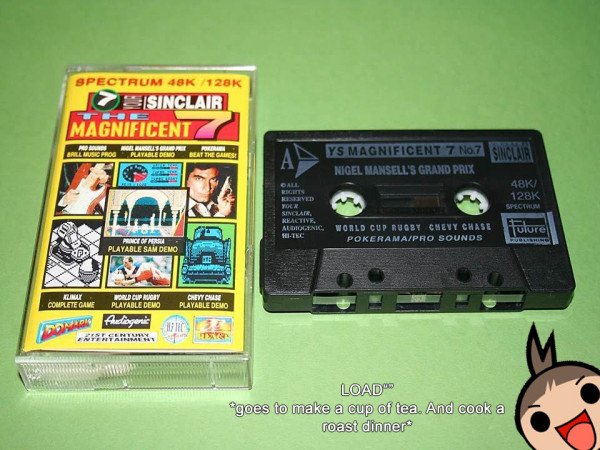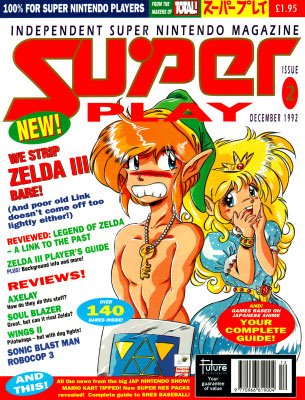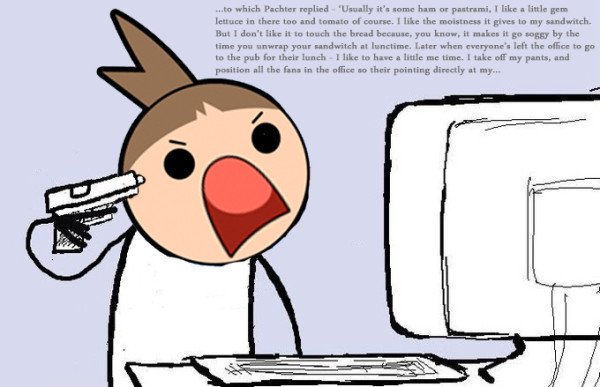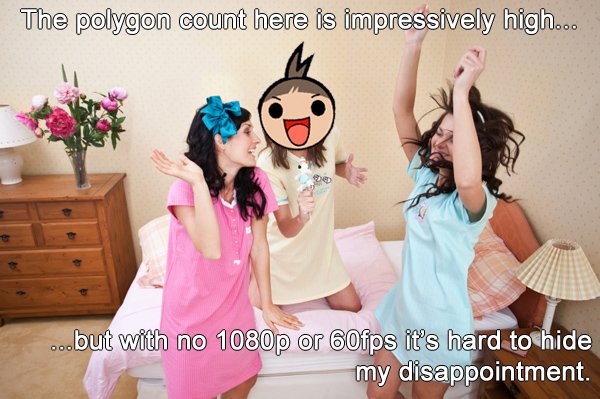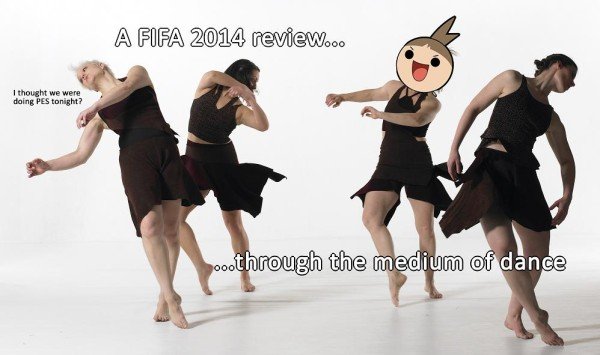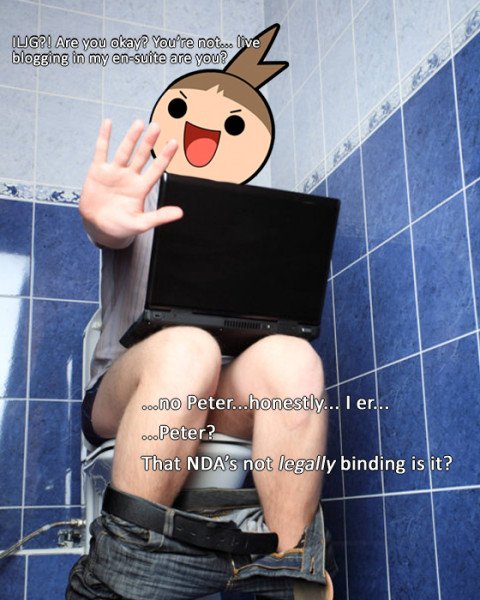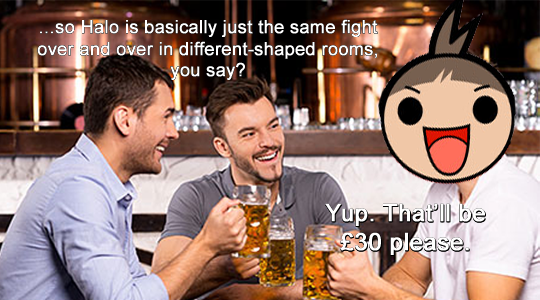Games Journalism is dead
Games journalism is shit. Games journalism is dead. Games journalism is broken. Games journalism is corrupt – I read a lot of that. Games journalism does have its share of ‘problems’ – but I don’t really care about the most common complaints. It doesn’t bother me that a journalist might have stayed in a nice hotel or eaten a nice steak before reviewing Call of Duty.
When I see a disclaimer about the circumstances behind a preview I unconsciously roll my eyes. For me, the concerns I have with games journalism are a little different – and I will do my best to outline them here.
Maybe it will make sense by the time I get to the end. Maybe I’ll have an answer to my concerns. Maybe I won’t.
Regardless, there’s one thing I do know;
Print is dead! Long live print!
For those of you who don’t know me – I live in the UK. I don’t think it’s an exaggeration to say the UK has something of a proud history for games writing. Certainly two decades of exceptional print magazines – though this is swiftly coming to an end. I don’t think I can argue that the UK has a monopoly on decent games writing either – but I can only write about what I know, and so that’s where I’m going to start.
The first games mag I ever read was called Your Sinclair. I came for the covermount – a cassette tape crudely sellotaped to the magazine, the paper it was attached to (oh the folly of youth!) often surplus to requirements. That is, until one month, the last copy in the newsagent was missing its ‘Magnificent Seven’ compilation and I was forced to, you know, actually read the magazine itself.
From that day onward I stayed for the writing. Videogames magazines were as much the highlight of my month as the games themselves. C&VG, Mean Machine and Mechatech, paved the way to Super Play and PC Zone, and they in turn to the N64 Magazine lineage and PC Gamer.
I devoured them. Cover to cover. And I laughed. Heartily at points, sometimes to the point of tears, often with a kind of near-silent abdominal laughter that would make my parents think I was having a seizure.
These magazines kept me informed (for there wasn’t much internet happening back then) but my love for them ran deeper than that. They were monthly events. They were complete products in and of themselves. They differed in style and, crucially in humor. It was less about learning ‘which games are good’ – though more on this subject later – but about enjoying the magazines themselves. Revelling in their jokes, a growing understanding of which writers liked which kinds of games and enjoying the craft of a magazine in its entirety, not just the individual reviews and features which made up the whole.
In many ways they shaped who I am today, informed my tastes, what I laugh at, and the way I write. It was this magazine, for example, that kickstared my interest in Japanese games and anime.
While the slow death of print publications is well documented – and it’s not something I feel I particularly need to re-tread here – I do mourn, to some extent, what they’re leaving behind. Not the paper they’re written on, but the manner in which they were produced.
Online publications, by their very nature are written by disparate teams, often not in the same country, let alone town or office – and with that fact, gone is the sense of cameraderie and unity that so-shaped those publications of the 90’s.
There’s a level of consistency on the main websites of the present day of course, but so too, an unshakeable feeling that they’re just a broad platform onto which individual chunks of copy are simply deposited as a means covering the game of the moment, the announcement of the day or the agenda which will drive the most traffic.
That sense of unity, of cohesion – of one magazine as a family, a clan – has somehow fallen by the wayside, certainly in the last decade. Games journalism would do well to try to reclaim that.
If everybody looked the same… we’d-get-tired of looking-at-each-oth-er.
So wailed some perky Groove Armada songstress, and it sums up how I feel about games journalism on the whole. Yes, there are notable exceptions everywhere (please don’t think I’m tarring everyone with the same brush) but you can’t deny there’s an awful lot of dry, functional games writing out there.
To my mind it’s systemic – a direct result of two core functions of games journalism. One is to report the facts – ‘Game X is will be available on date Y and developer Z said A, B and C about functions D, E and F’. In the race to be the first person to note secret function ‘G’ – it’s quicker just to get the facts up there. To plant your flag in the seething morass of news stories that bubble up throughout the course of the day.
We’re hungry for the facts – what’s coming, which trailer looks nice, which screenshots are potentially bare-faced lies, w̶h̶a̶t̶ ̶M̶i̶c̶h̶a̶e̶l̶ ̶P̶a̶c̶h̶t̶e̶r̶ ̶h̶a̶d̶ ̶f̶o̶r̶ ̶b̶r̶e̶a̶k̶f̶a̶s̶t̶ and how that’s going effect Microsoft’s bottom line. I get that, and to some extent – it’s unavoidable. Facts are facts, and one story reporting them will inevitably be much the same as the other.
What concerns me the most is that, in the other core staple of games writing, reviews – where opinion, personal opinion is so crucial – there’s the same worrying homogenisation of style, tone and, often, the opinion itself…
Metacritic is the yard stick by which I measure this… this… congealing of opinion. Enter any game title, open up the full list of reviews and watch the uniform colours and incrementally decreasing scores unfold before your very eyes. The problem is right there. The scores.
In forcing writers to place a numerical value to their copy, they fall into a nicely regimented, colour-coded catalogue of ‘opinion’ that – from 86 to 87 to 88 read largely the same. Lest we forget that each of these is written by an individual, a living breathing human being – each with their own past histories, loves, losses, foibles – not that you’d know it from their copy.

Why has it come to this?
I like Metacritic for one reason alone – I look for a game and then read the review of the lowest score. It’s a game I also play on GameFAQs, where the worst scores often hide the most entertaining reviews. I LOVE reading this shit. Sure they’re often absolute nonsense – but damn are they enjoyable, painfully enjoyable to read – even when they’re filled with boiling hot fanboy rage.
I love that rage. I love how their blind passion, their incoherent babbling and utter, utter lunacy leave you in no doubt about what they, personally, feel about a game. I might not agree of course, but I love that these reviews exists. Sure, these guys would do well to learn the function of a full-stop, but for all their naivete, I have an understanding about what the author is all about, who they are and why they might keep human hair in their fridge.
Yes, Uncharted 3 is a ‘good game’, but Drake is still a leather-faced douche. 6/10
When I was in high school, my parents went away for the weekend leaving me at home with my older sister who, behind their back, invited her friends over for the weekend. I was annoyed about being stuck in the house with her at first. But then her friends turned up – and they proceeded to do little more than smoke, gossip and drink Perno in their pyjamas.
If this weekend was a Videogame – how might your average Metacritic review read?
“The cigarette burns on the lead character’s flannelette pyjamas ruin the otherwise competent visuals… the dialogue is slurred and difficult to follow – making the story confusing… the ‘Badly Scratched Dresser’ and ‘Fabreeze Sunday’ DLC feel like an after-thought… “
VERDICT: Not bad, if you like this sort of thing – 68%
Listening to teenage girls swearing, crying and vomiting for three days straight may well warrant 68% – maybe 67% – but the fact is, it was the most intensely arousing 72 hours of my early teenage years. Three days of emotionally exhausting confusion, hope, discovery, elation and ultimately, crushing, crushing despair.
‘Every time I think about it, I have to readjust my trousers, curl into the foetal position – my clenched fist in my mouth – while the left side of my face involuntarily twitches’.
VERDICT: My friends will never believe me* – 98%
When, as I often do, find a more emotionally charged appraisal of a videogame in the comments section below the review itself, to me, it suggests there’s something not quite right.
Why is there this unwritten rule that a review must strive to be as ‘objective’ as possible – peculiar when, in doing so, the writer is fighting against the very point of the review in the first place – an expression of opinion. Why not present it unadulterated, raw, heartfelt. If you’re trying to be objective throughout in your writing of a review – you’re going out of your way to make it the same review as everyone else’s. It seems absurd.**
I’m not asking for anyone to write those hideous concept reviews – but it would be nice to feel a deeper, personal connection with the author and, ideally, to be entertained.
Why isn’t there as much diversity to game reviews as there is in human personality? Having to peg a numerical value to your copy is one thing, but there’s also another problem – the internet, the gamer’s hive-mind seems to discourage any diversity. Carolyn Petit was vilified for having the audacity to give Grand Theft Auto a lowly 9/10 while suggesting the game’s treatment of women was a little suspect. I mean, honestly – how dare she.
Is it any wonder I feel that many reviewers are holding back – not really drilling down to their true feelings, their true opinion of a game. They’re scared, consciously or not, of straying too far from the herd.
Whatever you do, don’t rock the boat.
TL; DR – Please review in 140 characters or less.
I read in a recent copy of PLAY (a UK PlayStation magazine) a feature called the ‘Top Ten Weirdest Games on Vita’ – it basically listed all the games I like on that system. The magazine may as well have sounded a klaxxon and shouted;
THE REMAINING PAGES IN THIS MAGAZINE ARE NOT FOR YOU!**
And there lies the problem. The vast majority of what I read is becoming increasingly irrelevant to me. It simply doesn’t speak to me.
When I pick up games news each morning on the way to work it’s usually directly from the publishers sites, Facebook pages, twitter feeds etc. Sometimes I’ll share something that I like with others via this very site, or my own Facebook or twitter – but once the news on any given title is out, I already know if I want it or not.
One look at No Mans Sky’s trailer and know I will definitely buy it. One look at the Fairy Fencer F boxart and it’s already pre-ordered. Reading IGN isn’t going to make any difference.
And so increasingly my reading habits are moving away from ‘professional’ writers – and more toward social media. I have a list of people on Twitter that I like – people send me ‘check this out’ messages, and if I have the time and money, I do.
No rambling, no scores just one sentence suggesting I might like something. Those who’ve followed my twitter for a while seem to know what I like – and they’re usually right.
My circle of friends and a community of like-minded people online have, effectively, become my games press – and the larger and broader the community becomes the more voices and opinions I get to hear and the more enriched my ‘games press’ becomes.
I don’t necessarily know them personally, but I value their opinions. They have no agenda, they just tell me what they like and why they like it. They’re not ‘Games Journalists’ but they’re happy, passionate, literate people from the ages of 13-to-30 (and beyond) – what makes their opinion any less important than, say, the editors of Kotaku? What benefit do I get from reading Kotaku over the tweets of those following me on twitter?
In a race of ‘Who can be the first person to poop in Peter Molyneux’s downstairs toilet’ I imagine Mr and Mrs Kotaku have industry access that would allow them to win that round – but apart from that? Absolutely nothing.
‘The problem is, any idiot with a keyboard can be a games journalist’
Is something else I read quite a lot. Fact is, I AM one of those idiots. I’m not a games journalist – I write about videogames in between work and anything else that life throws me.
I don’t even know why I do it – I’m just compelled to do it. About two years ago I started a Facebook page for no reason other than I wanted to talk about the games I liked, with people who also like the same games as me. And deep down, the vainest parts of me are excited by the thought that someone might find what I have to say entertaining, or god forbid, funny.
I don’t get paid for it, in some ways I don’t WANT to be paid for it. If I’m paid to do it, I’d have to do it – and it’s not something I want to HAVE to do.
I’m not alone in that sentiment. I’m sure there are plenty of bloggers, YouTubers, LetsPlayers in the same position as me – who are just doing it because, well… they like doing it. From what I gather, people giving their opinion for nothing is kinda frowned on in Games Journalism circles – I’ve certainly read tweets to that effect.
But why? I don’t charge people when I suggest they buy YS Celcetta over dinner.
One thing that enthusiast writers , bloggers and video-makers are doing is challenging the landscape of games journalism. Forcing it to look at itself, forcing it to change – ultimately putting paid writers in a position where they have to justify their work. Is this a bad thing? For the writers themselves – yes of course it is. I’m not unsympathetic to that, but when it comes down to it, those who’s daily tasks amount to little more than;
‘NHL 14 is a bit better than last year’s – but probably not worth playing if you bought 2013 and are not a massive Ice Hockey fan – 64%‘
…are inevitably going to fall by the wayside.
Sad, yes, but in the same breath, those who are able to bring genuine entertainment to their writing, or hard-nosed analysis through an encyclopedic knowledge of the industry, or are able conduct an interview with questions more insightful than ‘how many levels/guns/nipples does it have’ – will succeed.
The best writers, or those able to deliver the best content will naturally gravitate to the top – that I am sure of, because underneath it all I am something of a hopeless idealist.
Can Games Journalism in its current form survive? Not really – and certainly not where the traditional News, Reviews, Previews format is concerned. It’s too easy to share opinion freely, and Publishers can disseminate information to gamer’s easier than ever before via social media, spreading their own news – effectively cutting out the middleman.
So what role can ‘Games Journalists’ play in the future? I honestly don’t know****, you’d need to ask one. And after 2661 words, my fingers are kinda tired so, yeah..
Until next time.
ILJG
xxx
ILJG runs the I Love Japanese Games Facebook Page.
His views are not those held by Rice Digital or it’s partners.
* They didn’t believe me.
**Something I’m often guilty of myself, I must admit.
***you disgusting pervert
**** I imagine it’s not lists about sexy games or robots I’d like to have sex with or attractive girls in cosplay or news stories about Hideo Kojima’s sex life.
- Wonderful new Konosuba game gets release date and pre-order - January 11, 2024
- Kandagawa Jet Girls gameplay featuring Senran Kagura DLC - January 16, 2020
- Japanese politicians look to limit videogame play time for kids - January 13, 2020



